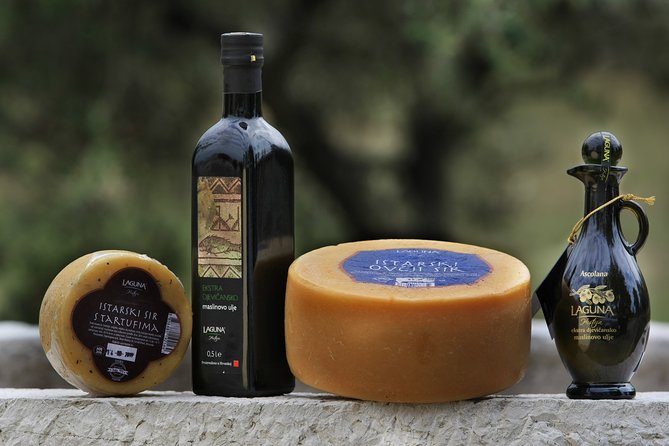Tasting of Award-Winning Olive Oils
Some may argue that all olive oils taste the same, but the world of award-winning olive oils begs to differ. As enthusiasts gather to savor the complexities of these esteemed oils, they uncover a realm of flavors that paint a vivid picture of the olive groves they originated from.
From the peppery notes of Tuscan oils to the fruity undertones of Spanish varieties, each drop tells a story waiting to be explored. Discover how these exceptional oils captivate the senses and elevate culinary experiences to new heights.
Key Points

- Award-winning olive oils showcase excellence in grading, authenticity, and taste profiles.
- Top producing regions like Spain, Italy, Greece, and Turkey lead in quality olive oil production.
- High-quality olive oils offer health benefits such as heart health support and antioxidants.
- Olive oil tasting techniques involve using dark glasses, swirling, aspirating, and understanding production methods.
Judging Criteria for Award-Winning Olive Oils

When evaluating award-winning olive oils, judges meticulously analyze various factors to determine the top contenders. One key aspect they consider is olive oil grading and authenticity. Judges assess if the oil meets specific standards set by regulatory bodies to ensure quality. This involves examining characteristics like acidity levels, taste profiles, and purity to confirm the oil’s authenticity.
Plus, the olive oil extraction and processing methods play a crucial role in the judging process. Judges look at how the olives were harvested, pressed, and processed to gauge the overall quality and flavor of the oil. These factors contribute significantly to selecting the finest olive oils worthy of prestigious awards.
Top Olive Oil Producing Regions
Among the top olive oil producing regions globally, the Mediterranean stands out for its rich history and quality harvests. The Mediterranean region, encompassing countries like Spain, Italy, Greece, and Turkey, is renowned for its vast olive groves and traditional olive oil production methods.
These areas not only produce a significant portion of the world’s olive oil but also attract visitors interested in olive oil tourism. Tourists can explore olive orchards, witness the olive oil-making process, and sample freshly pressed oils.
Plus, top chefs from these regions often incorporate olive oil into a variety of delicious dishes, making olive oil recipes a significant part of the culinary culture. The Mediterranean’s dedication to olive oil cultivation and its ties to gastronomy make it a must-visit for any olive oil enthusiast.
Benefits of Consuming High-Quality Olive Oil

The allure of the Mediterranean’s top olive oil producing regions extends beyond picturesque landscapes and traditional olive oil production methods; it lies in the myriad benefits of consuming high-quality olive oil.
- Heart Health: Rich in monounsaturated fats, high-quality olive oil can help lower bad cholesterol levels.
- Antioxidant Properties: Packed with antioxidants, it may reduce oxidative damage in the body.
- Anti-Inflammatory Effects: The anti-inflammatory properties of olive oil can benefit overall health.
- Weight Management: When used in moderation, olive oil can be a healthier alternative in cooking applications.
- Diverse Flavor Profiles: From peppery and robust to fruity and delicate, high-quality olive oils offer a wide range of flavor profiles that enhance culinary creations.
Olive Oil Tasting Techniques
To fully appreciate the nuances of different olive oils, one must master the art of olive oil tasting techniques. When tasting olive oil, it’s essential to use a dark blue or green tasting glass to prevent any influence from the oil’s color.
Swirling the oil in the glass helps release its aromas, allowing one to detect fruity, grassy, or peppery notes. When sipping the oil, aspirating it as if sipping wine helps distribute the flavors evenly across the palate.
Understanding olive oil production methods can also enhance tasting experiences, as oils from different regions or made with specific olive varieties can offer unique flavors. Exploring olive oil recipes can further deepen appreciation for the diverse uses and flavors of this versatile ingredient.
Pairing Olive Oil With Food
Pair different varieties of olive oil with complementary dishes to elevate the flavors of your meals and enhance your culinary experience. When pairing olive oil with food, consider the following tips:
- Use robust olive oil with intense flavors for grilled meats and hearty dishes.
- Drizzle delicate olive oil over fresh salads or steamed vegetables to preserve its subtle flavors.
- Pair fruity olive oil with desserts like vanilla ice cream or dark chocolate for a unique twist.
- Experiment with herb-infused olive oils for dipping bread or marinating ingredients.
- Match peppery olive oil with soups or pasta dishes to add a spicy kick to your meals.
Sustainability Practices in Olive Oil Production
Exploring the sustainability practices intertwined with olive oil production reveals the conscientious efforts made within the industry to preserve the environment and uphold ethical standards.
Olive oil producers are increasingly aware of their environmental impact and are implementing measures to reduce it. From utilizing sustainable farming practices to minimizing water usage and promoting biodiversity, these initiatives aim to protect the ecosystem.
On top of that, many producers are adopting fair trade practices to ensure that workers are ethically treated and compensated. By supporting fair trade, consumers contribute to a more equitable olive oil industry.
These combined efforts not only benefit the environment but also promote social responsibility within the olive oil production chain.
Health Benefits of Extra Virgin Olive Oil

The exceptional health benefits of extra virgin olive oil make it a highly sought-after dietary staple for those aiming to improve their overall well-being.
-
Rich in Antioxidants: Extra virgin olive oil contains powerful antioxidants that help protect the body from damage caused by free radicals.
-
Heart Health: Regular consumption of extra virgin olive oil is associated with a reduced risk of heart disease.
-
Anti-Inflammatory Properties: It has anti-inflammatory effects, which may help in reducing inflammation in the body.
-
Cooking Versatility: Extra virgin olive oil is a versatile ingredient suitable for various cooking applications, such as sautéing, roasting, and dressing salads.
-
Nutritional Value: It’s a good source of monounsaturated fats and vitamin E, contributing to a healthy diet.
These qualities make extra virgin olive oil a beneficial addition to a balanced diet.
Tips for Storing Olive Oil
To ensure the quality and flavor of your olive oil remains intact, proper storage is essential. Olive oil is sensitive to light, heat, and air, so it’s crucial to store it in a cool, dark place away from direct sunlight and heat sources like stoves or ovens.
Choose a pantry or cupboard that maintains a consistent temperature. Make sure the bottle is tightly sealed to prevent oxidation, which can lead to rancidity. It’s best to use olive oil within six months to a year of opening to enjoy its peak flavor.
Always check for any signs of spoilage, such as a musty smell or off taste, to ensure you’re using fresh olive oil that enhances your dishes.
Common questions
Can I Purchase the Award-Winning Olive Oils Online?
Yes, customers can purchase the award-winning olive oils online. They offer convenient online availability and various shipping options. Customers can choose their preferred shipping method during the checkout process, ensuring a seamless delivery experience.
Are There Any Restrictions on Bringing Award-Winning Olive Oils Back to My Home Country?
Import regulations and travel restrictions may apply when bringing award-winning olive oils back to your home country. It is essential to check the specific rules and limitations to ensure a smooth and legal process.
Are There Any Special Events or Festivals Dedicated to Celebrating Award-Winning Olive Oils?
Olive oil tastings and festivals are popular events that celebrate the excellence of award-winning olive oils. These gatherings offer a unique opportunity to sample premium oils, learn about production methods, and appreciate the nuances of different varieties.
Can I Visit the Olive Oil Producers to See the Production Process in Person?
Visiting olive oil producers allows guests to witness the fascinating production process firsthand. Engaging with experts and observing the meticulous steps involved in creating high-quality olive oil offers a unique and educational experience for visitors.
Are There Any Unique or Rare Varieties of Olives Used in the Award-Winning Olive Oils?
When exploring rare olive varieties, one might stumble upon unique flavors unlike any other. These award-winning olive oils boast a diverse range of tastes, making them a delightful treat for the adventurous palate seeking something distinctive and special.
Last Words
Set out on a sensory journey with award-winning olive oils, guided by expert knowledge and exclusive experiences. Discover the rich aromas, distinctive flavors, and health benefits of these exceptional oils.
From tasting techniques to pairing with food, there’s a world of exploration waiting for you. Dive into the world of olive oil production, sustainability practices, and top producing regions.
Elevate your culinary experience with high-quality olive oils and savor the flavors that set them apart.